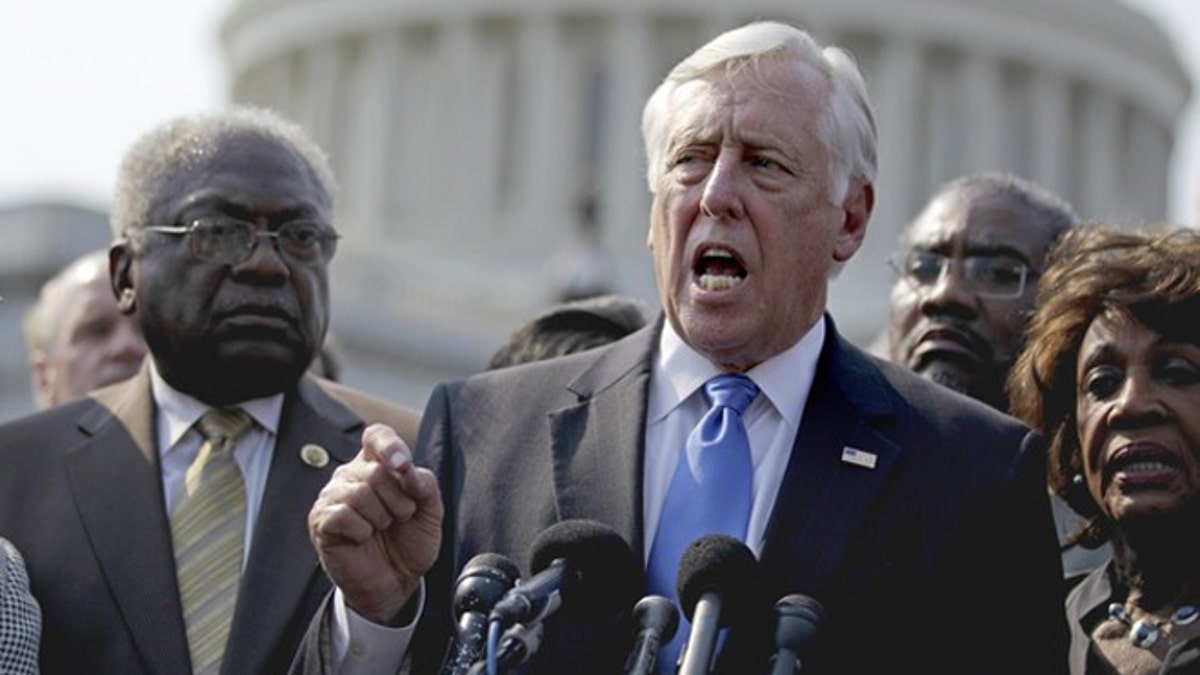
Israeli Prime Minister Benjamin Netanyahu is adamantly opposed to the deal. (AP)
The traditional August-recess trip to Israel for House freshman is emerging as a high-stakes journey this year, with members returning next month to vote on the Iran nuclear deal that Israeli Prime Minister Benjamin Netanyahu strongly opposes.
President Obama has worked furiously to get congressional approval for the international deal, which would limit Iran’s nuclear-development program in exchange for the lifting of billions of dollars’ worth of crippling economic sanctions. Republicans in the House and Senate uniformly oppose the deal, but would need a two-thirds majority -- including strong support from Democrats -- to override an almost certain presidential veto.
" ... it was clear he hopes they will vote against the agreement because it is a bad deal that will allow Iran to have a path to a nuclear bomb in 13 years.”
The tandem trips -- Democrats returned Monday and Republicans depart later this week -- gave Netanyahu the chance to press his case in person. House Minority Whip Steny Hoyer, D-Md., who led a 22-member delegation and was himself undecided before leaving, said the group met over the weekend with Netanyahu for nearly two hours and that the prime minister made his point without trying to tell them how to vote.
“But it was clear he hopes they will vote against the agreement because it is a bad deal that will allow Iran to have a path to a nuclear bomb in 13 years,” Hoyer told Haaretz.

House Minority Whip Steny Hoyer, who led the Democratic delegation to Israel, says he is undecided about the Iran deal. (AP)
If all Republicans in both Houses stand firm against the deal, a veto override would require 43 Democrat votes in the House and 13 in the Senate. And while the trip did not include members of the upper chamber, should more House Democrats join key New York lawmakers Sen. Chuck Schumer and Rep. Eliot Engel in coming out publicly against the deal, it could provide momentum for blocking it.
Schumer, who is expected to become the next Senate Democratic leader, broke from the president on Thursday and said that he would vote to disapprove of the deal, fearing Iran will use it to, in fact. "pursue its nefarious goals.” By far the highest-profile Democrat to come out against it, Schumer has been joined by Engel, the ranking member on the House Foreign Affairs Committee, and at least four other congressional Jewish lawmakers who have also recently said they will vote no.
Still, the administration has support from roughly a dozen Senate Democrats and more than two dozen House Democrats, including Minority Leader Nancy Pelosi, D-Calif., according to The Associated Press.
Roughly 40 House lawmakers, most freshmen, have made or will make the trip to Israel this month. Hoyer's group also reportedly met Thursday with Palestinian Authority Finance Minister Shukri Bishara. However, there are no reports that the Iran deal was discussed in that meeting.
The trips are being sponsored and organized by an affiliate of the powerful American Israel Public Affairs Committee, or AIPAC, which strongly opposes the Iran deal.
An AIPAC source on Monday downplayed the trip’s impact on the Iran deal, saying it is a regularly scheduled event, held every other year, and that it is not related to the vote.
IIan Sherman, vice president of the American Foreign Policy Council, told FoxNews.com that there is a “tremendous sense in Israel that this is a bad deal.”
But he said it is hard to say how much influence the trip will have on members.
“Still, these members, Jewish or not, are doing their due diligence,” Sherman said. “There is now a groundswell of opposition for the first round (of votes). But it’s far less clear about the veto.”
Republicans have long opposed the deal upon which Iran, the United States and five other world powers agreed July 14.
House Speaker John Boehner even invited Netanyahu to speak in March before Congress about his opposition to the deal -- a move the White House, Hoyer and fellow Democrats blasted as a breach of diplomatic protocol.
House Majority Leader Kevin McCarthy, the California Republican who was scheduled to lead the GOP delegation to Israel, expressed serious concerns about the deal after it was struck, but vowed that Congress would thoroughly evaluate the details before making a final decision. However, he appears more opposed to the deal as the Congress nears its 60-day review period and projected mid-September vote, tweeting about the "bad deal" the day after Schumer announced his position.
McCarthy staffers have not responded to several attempts to learn whether he indeed made the trip.
Other members of the Republican delegation scheduled to make the trip include Reps. Carlos Curbelo, Florida; Martha McSally, Arizona; and Mimi Walters, California.
"Without question, it's a wonderful opportunity to get a unique perspective from the Middle East before having to cast one of the most important votes of this Congress," Curbelo told The Hill before departing.




